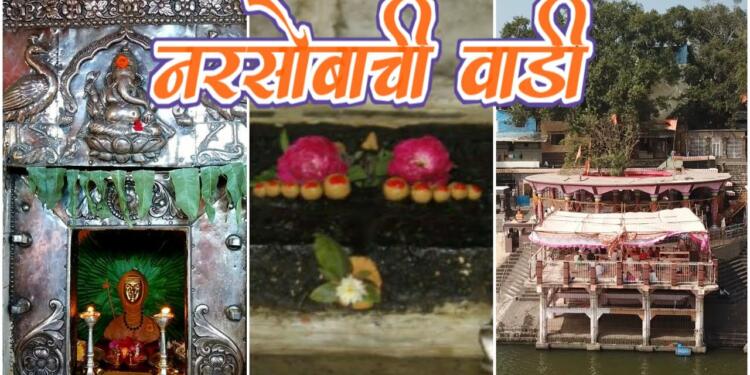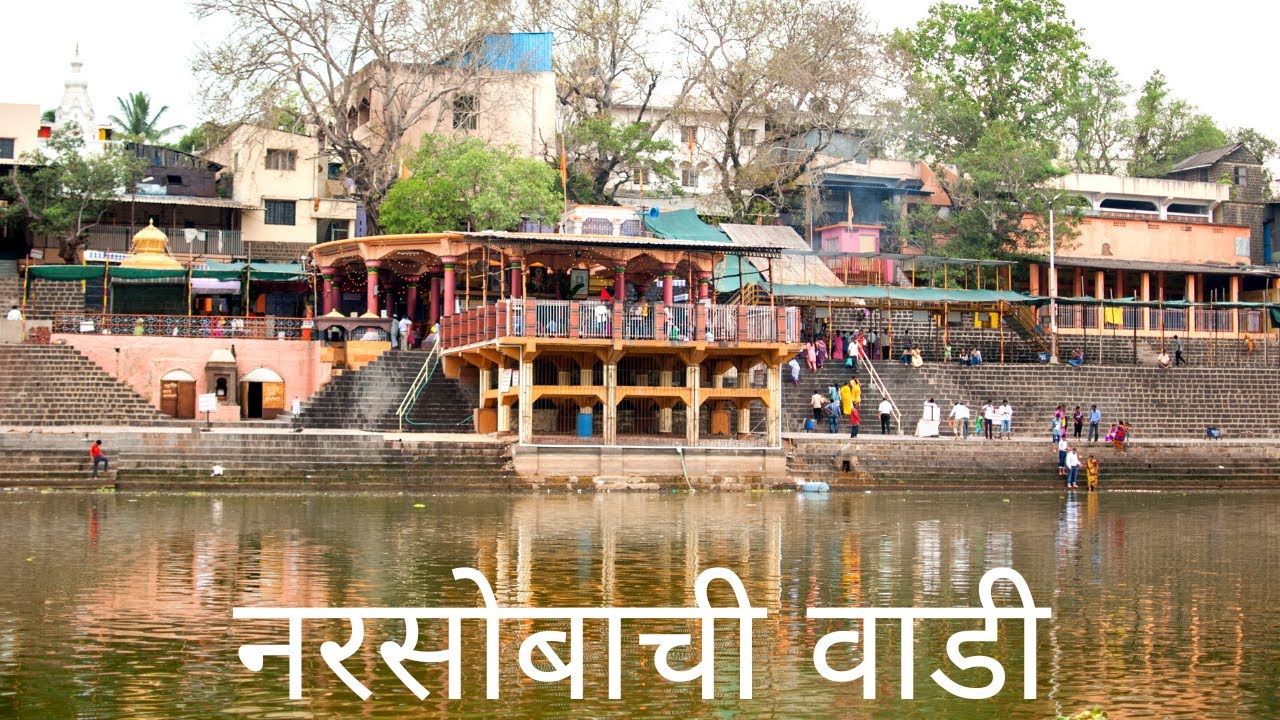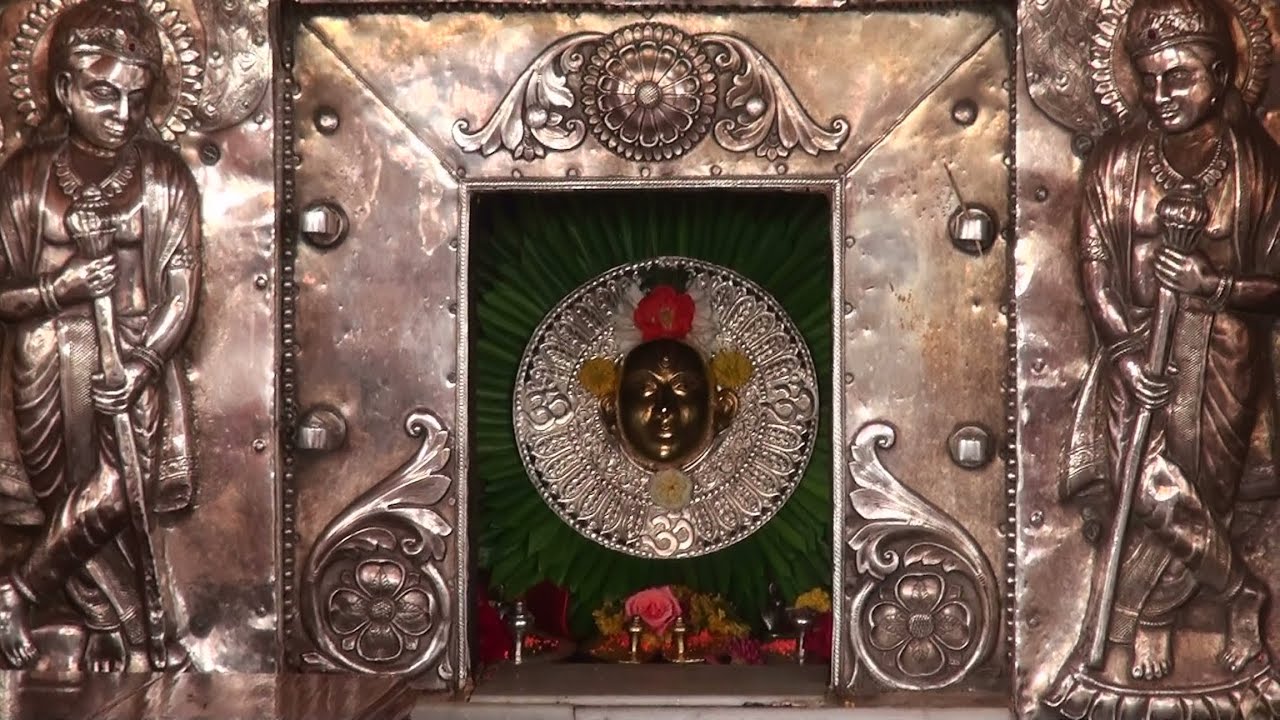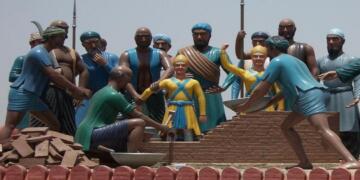Narsobachi Wadi Mandir Shirol – Guide
Narsobachi Wadi Mandir also known as Narsobachi Wadi, a small town located in Shirol, Taluka of Kolhapur district of Maharashtra. It is very famous for the Hindu temple of Sri Lord Dattatreya. Sri Narasimha Saraswati was an incarnation of Lord Sri Dattatreya in the year 1378 to 1458 and He is believed to have lived in Narsobachi Wadi.
The Narsobachi Wadi Mandir Shirol is situated on the bank of a river which is the confluence of two rivers Panchganga and Krishna river. The temple is a major pilgrimage site for many Lord Dattatreya devotees. Shri Bhagwan Dattatreya in his Narasimha Saraswati avatar meditated for about 12 years as per the context of the text Shri Gurucharitra. In this temple, the devotee will not find any images or idols, but there are two padukas carved in stone which are said to be the footprints of Sri Narasimha Saraswati.
History of this Temple
The history of Narsobachi Wadi Mandir Shirol is found in the Gurucharita, a very ancient Hindu literature. Sri Narasimha Saraswati visited the Panch Ganga Sagar river at Narsobawadi. According to the texts, Sri Narasimha Saraswati lived here for 12 years. There is a temple of Amareshwar on the other side of the river and hence the place is called Amarpur. Nearby is the Shakti Tirtha, where the sixty-four Yogini Shaktis who serve and worship Amareshwar reside. This place later came to be known as Narsobwadi after the name of Sri Narasimha Saraswati.
Also Read: Gatha Mandir Dehu, Timings, History, Travel Guide and How to reach
Narsobachi Wadi Mandir Shirol Timings
Narsobachi Wadi Mandir Shirol opens at 5:00 AM in the morning and close at 10:00 PM in the evening. 8.00 to 12.00 – Rudrabhishek, 12.30 to 13.30 – Maha Puja, Aarti 15.00 to 16.00 – Pavaman Sukta Parayan, 19.30 – Dhoop Aarti, 22.00 – Shej Aarti.
| Saturday | 05:00 AM to 10:00 PM, Aarti 15.00 to 16.00 PM |
| Sunday | 05:00 AM to 10:00 PM, Aarti 15.00 to 16.00 PM |
| Monday | 05:00 AM to 10:00 PM, Aarti 15.00 to 16.00 PM |
| Tuesday | 05:00 AM to 10:00 PM, Aarti 15.00 to 16.00 PM |
| Wednesday | 05:00 AM to 10:00 PM, Aarti 15.00 to 16.00 PM |
| Thursday | 05:00 AM to 10:00 PM, Aarti 15.00 to 16.00 PM |
| Friday | 05:00 AM to 10:00 PM, Aarti 15.00 to 16.00 PM |
Also Read: Hari Ki Pauri Haridwar, Timings, History, Travel Guide and How to reach
Places to visit near this Temple
Shri Chhatrapati Shahu Museum
Shri Chhatrapati Shahu Museum or the New Palace as it is popularly called is a wonderful structure built in the year 1884. The Palace is an excellent example of Indian architecture.
Kalamba Lake
One of the most enchanting places to visit in Kolhapur, Kalamba Lake is a beautiful water body spread over an area of 63 acres. It is the main source of water for Kolhapur.
Shri Mahalakshmi Temple
Shri Mahalakshmi Temple tops the list of popular places to visit here in Kolhapur. A magnificent 7th century temple built by the Chalukya rulers, Sri Mahalakshmi Temple is considered to be one of the 6 Shaktipeeths of India.
Rankala Lake
The scenic Rankala Lake is another important landmark in the list of top places to visit in Kolhapur. The lake is believed to have been formed after a major earthquake in the region in the ninth century, which inundated a stone quarry at the site.

Also Read: Kunkeshwar Mandir Timings, History, Travel Guide, and How to reach
How to reach this Temple
By Air- The nearest airport from Narsobachi Wadi Mandir Shirol is Kolhapur Airport which is well connected to the other cities and countries. From here you can easily reach this temple by using local transport services or taxi.
By Train- The nearest railway station from Narsobachi Wadi Mandir Shirol is Kolhapur railway station. From here you can easily reach this temple by using local transport services or taxi.
By Road- Roads to this temple are well connected with the other cities of the country so you can easily reach this temple by using your own vehicle or by any public buses or taxi from any part of the country.
Subscribe our TFI Dharma YouTube channel to watch Devotional videos because we are here to serve Sanatana Dhrama: TFIDHARMA
























